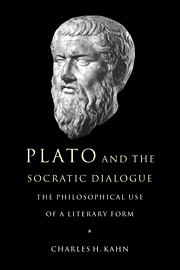Book contents
- Frontmatter
- Contents
- Preface
- List of abbreviations
- 1 Sōkratikoi logoi: the literary and intellectual background of Plato's work
- 2 The interpretation of Plato
- 3 Socrates
- 4 Plato as a minor Socratic: Ion and Hippias Minor
- 5 Gorgias: Plato's manifesto for philosophy
- 6 The priority of definition: from Laches to Meno
- 7 Charmides and the search for beneficial knowledge
- 8 Protagoras: virtue as knowledge
- 9 The object of love
- 10 The emergence of dialectic
- 11 The presentation of the Forms
- 12 Phaedrus and the limits of writing
- Appendix On Xenophon's use of Platonic texts
- Bibliography
- Indexes
Appendix - On Xenophon's use of Platonic texts
Published online by Cambridge University Press: 02 November 2009
- Frontmatter
- Contents
- Preface
- List of abbreviations
- 1 Sōkratikoi logoi: the literary and intellectual background of Plato's work
- 2 The interpretation of Plato
- 3 Socrates
- 4 Plato as a minor Socratic: Ion and Hippias Minor
- 5 Gorgias: Plato's manifesto for philosophy
- 6 The priority of definition: from Laches to Meno
- 7 Charmides and the search for beneficial knowledge
- 8 Protagoras: virtue as knowledge
- 9 The object of love
- 10 The emergence of dialectic
- 11 The presentation of the Forms
- 12 Phaedrus and the limits of writing
- Appendix On Xenophon's use of Platonic texts
- Bibliography
- Indexes
Summary
In Chapter 3 § 3 we examine a text concerning dialectic in Memorabilia IV.5–6 where the influence of Plato is, I believe, unmistakable. But this is not an isolated case. I consider here a number of parallel texts to demonstrate how pervasive is Xenophon's dependence on Platonic material.
The importance of this Platonic influence on Xenophon must not be exaggerated. His use of Platonic texts is essentially superficial, almost cosmetic in nature. Xenophon seems to have had no real sympathy with Plato's portrayal of Socrates. Thus his Symposium, though no doubt inspired by Plato's dialogue and largely devoted to the same theme, is as different from that work in tone and substance as anything one can well imagine. As von Fritz pointed out, it would be a mistake to think of Xenophon as trying to compete with Plato; he simply rejects and hence ignores the spiritualized view of Socrates that Plato presents. In Antisthenes and Aeschines, on the other hand, Xenophon found more congenial representations of Socrates that he could to some extent absorb into his own portrayal.
A full study of the parallels between Xenophon and Plato would call for a separate monograph. What follows makes no claim to completeness. I simply note some eight or ten passages from the Memorabilia where the direct literary dependence of Xenophon upon Plato seems to me at least probable, and two from the Symposium where it seems certain.
(Mem. 1.6.14)
As for myself, just as someone else takes pleasure in a good horse or dog or bird, in the same way and even more so do I take pleasure in good friends.
- Type
- Chapter
- Information
- Plato and the Socratic DialogueThe Philosophical Use of a Literary Form, pp. 393 - 401Publisher: Cambridge University PressPrint publication year: 1997



